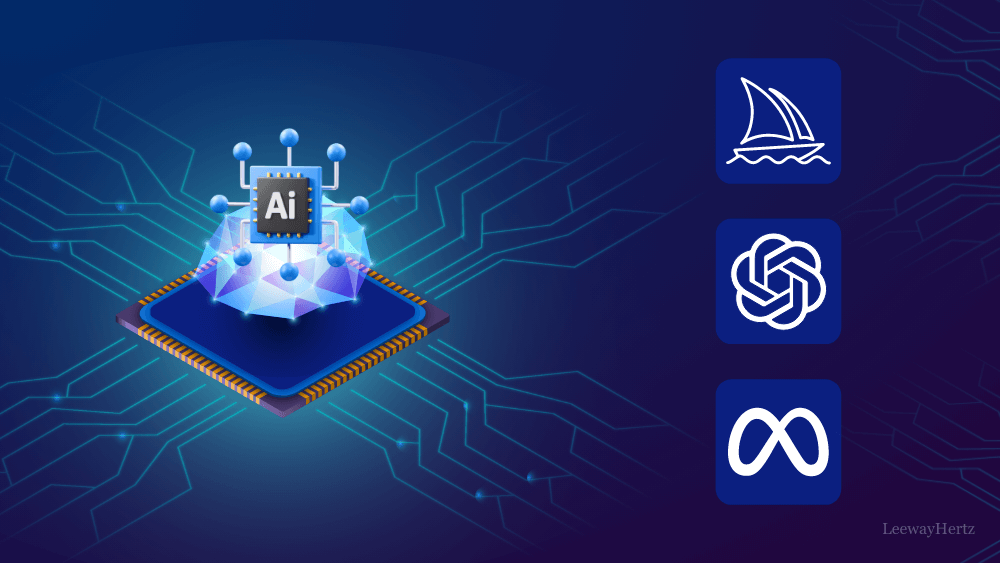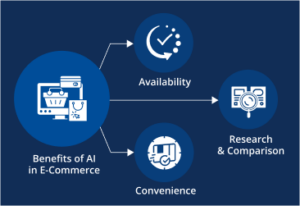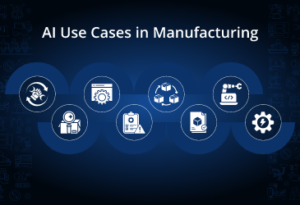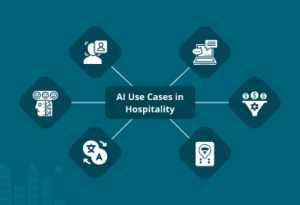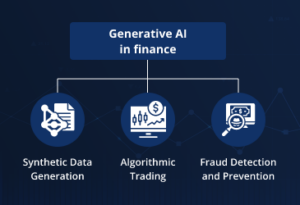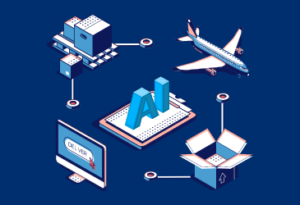AI Use Cases & Applications Across MAjor industries
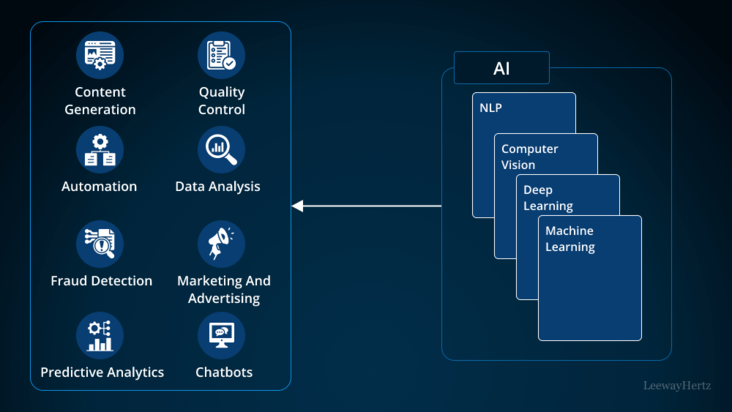
In the dynamic landscape of modern industries, businesses grapple with multifaceted challenges that range from operational inefficiencies to complex decision-making processes. Navigating through these pain points is a constant pursuit for enhanced performance and sustained growth. Artificial intelligence has evolved beyond a buzzword, becoming an indispensable tool for organizations seeking innovative solutions to their most pressing issues.
Businesses often need help with challenges such as data overload, inconsistent decision-making, resource allocation inefficiencies, and the need for real-time insights. These pain points can impede progress, hinder efficiency, and compromise the overall success of an enterprise. However, the integration of AI mitigates these challenges and propels businesses toward unprecedented levels of excellence.
In this era of digital acceleration, AI serves as a strategic ally, offering tailored use cases across major industries. From healthcare and finance to manufacturing and retail, the transformative impact of AI is reshaping traditional paradigms. By leveraging ML algorithms, predictive analytics, and advanced automation, businesses can harness the power of AI to streamline operations, optimize resource utilization, and gain insights into consumer behavior and market trends. According to a report by Grand View Research, by 2030, the global AI market size is expected to reach $1,811.8 billion, up from $136.6 billion in 2022, with a 38.1% CAGR.
This article highlights major industries using AI that have reaped substantial benefits from applications of AI and continue to hold immense potential for future growth. However, let’s begin by briefly discussing what artificial intelligence is.
- Role of AI in business operations?
- AI use cases in major industries
- How to implement AI in business operations
- How LeewayHertz’s enterprise AI solution transform business operations across industries?
Role of AI in business operations
American computer scientist and cognitive scientist John McCarthy, who coined the term artificial intelligence in 1956, defines it as “the science and engineering of making intelligent machines.”
AI refers to the ability of a computer or a computer-controlled robot to perform tasks commonly associated with intelligent beings, generally humans. As a result, it demonstrates powerful capabilities, such as the ability to reason, discover meaning, or learn from experience.
Artificial intelligence transforms business operations by automating tasks, analyzing data, and enhancing decision-making. From automating repetitive processes and optimizing supply chains to predicting maintenance needs and offering personalized customer experiences, AI significantly boosts operational efficiency. It plays a pivotal role in data-driven decision support, cybersecurity, and talent acquisition, fostering innovation across industries. AI’s continuous learning capabilities ensure adaptability to evolving business landscapes, cementing its role as a transformative force in achieving heightened productivity, cost savings, and a competitive edge for organizations navigating the complexities of the modern business environment.
Let’s look at the artificial intelligence use cases in some major industries.
AI use cases impacting major industries
Healthcare
The applications of AI in healthcare are:
- Medical imaging: AI accurately analyzes X-rays and CT scans, improving diagnosis speed and accuracy for diseases like pneumonia and tuberculosis. It aids in detecting lung nodules, reducing the risk of missing cancerous growths, and identifies osteoporosis in X-rays.
- Personalized treatment: AI leverages patient data, genetic information, and lifestyle factors to predict disease risks and tailor treatment plans. It assists in selecting optimal chemotherapy drugs based on genetic profiles and monitors patients remotely, detecting early signs of conditions like heart disease or diabetes.
- Electronic Health Records (EHRs): AI analyzes EHR data to identify patterns and trends, predict disease risks and enable personalized prevention strategies. It examines medical history, lifestyle, and genetic information to forecast risks such as diabetes or heart disease and identifies patterns in medication data to prevent adverse drug reactions.
- Fraud detection: AI scrutinizes vast healthcare data to detect irregular patterns, preventing fraud by identifying activities like overbilling or unnecessary procedures. It analyzes billing data to flag potentially fraudulent claims, ensuring resources are allocated to genuine patient care.
- Virtual assistants and chatbots: AI-driven virtual assistants offer remote patient guidance, delivering personalized health advice swiftly. They manage administrative tasks, handle appointment scheduling, and provide medication information, enhancing patient satisfaction and relieving healthcare professionals of administrative burdens.
- Remote patient care: AI-powered remote patient care delivers healthcare services regardless of location. Patients receive real-time attention and share health data remotely, and healthcare providers use AI to analyze trends, fostering proactive care. For instance, diabetic patients can continuously monitor glucose levels through wearables, remotely enabling swift adjustments to treatment plans.
Retail and e-commerce
Applications of AI in retail and e-commerce industry are:
- Personalized shopping experience: AI scrutinizes customer behavior, preferences, and purchase history, offering tailored product suggestions based on individualized insights. This enhances the shopping experience, increases customer engagement, and boosts sales by presenting items tailored to individual tastes.
- Dynamic pricing optimization: Retailers use AI algorithms to analyze real-time market conditions, competitor pricing, and customer demand. This enables dynamic pricing adjustments, ensuring optimal pricing strategies to remain competitive, maximize profits, and respond to market fluctuations effectively.
- Inventory management and demand forecasting: AI helps retailers optimize inventory levels by predicting demand patterns, seasonal fluctuations, and trends. This minimizes overstock and stockouts, reducing holding costs and improving overall supply chain efficiency. By accurately forecasting demand, retailers can ensure product availability and meet customer expectations.
- Chatbots for customer service: AI-powered chatbots are deployed to handle customer queries, provide instant support, and assist with order tracking. These virtual assistants are crucial in enhancing customer service and fostering a positive brand image by delivering prompt responses, addressing common issues, and elevating overall customer satisfaction.
- Visual search and image recognition: Retailers utilize AI-driven visual search technology to enable customers to search for products using images rather than text. This enhances the search experience, making it more intuitive and efficient. Additionally, image recognition technology can be employed for features like automatic product tagging, simplifying catalog management and improving search accuracy.
Food tech
- Supply chain optimization: AI optimizes the food supply chain by predicting demand, managing inventory, and improving logistics. This helps reduce waste, ensure timely deliveries, and enhance efficiency in moving food products from farms to consumers.
- Quality control and inspection: AI-powered systems are utilized for quality control in food processing. Computer vision algorithms can detect defects, contamination, or irregularities in food products, ensuring that only high-quality items reach the market.
- Flavor and recipe optimization: AI analyzes consumer preferences and trends to optimize food flavors and recipes. Food companies use machine learning algorithms to create new and innovative recipes that align with changing consumer tastes, leading to the development of novel and appealing food products.
- Menu customization in restaurants: AI is used in the restaurant industry to personalize menus based on customer preferences, dietary restrictions, and historical ordering data. This enhances the dining experience, increases customer satisfaction, and supports businesses in offering tailored food options.
Banking and financial services
AI applications in banking and finance include:
- Fraud detection and prevention: AI is utilized in banking and finance for real-time fraud detection by analyzing transaction patterns, identifying anomalies, and flagging potentially fraudulent activities. Machine learning algorithms adapt to evolving fraud patterns, enhancing the security of financial transactions.
- Credit scoring and risk assessment: Credit scoring powered by AI utilizes alternative data sources and ML algorithms to enhance the accuracy of assessing the creditworthiness of individuals and businesses. This leads to more effective risk management, empowering financial institutions to make well-informed lending decisions.
- Chatbots for customer service: AI-powered chatbots enhance customer service by providing instant responses to queries, assisting with account inquiries, and offering personalized financial advice. This automation streamlines customer interactions, improves satisfaction, and reduces response times.
- Algorithmic trading and robo-advisors: AI algorithms are used in algorithmic trading to analyze market trends, execute trades, and optimize investment portfolios. Robo-advisors leverage AI to provide automated, data-driven investment advice, catering to individual preferences and risk profiles, thereby democratizing access to wealth management services.
- Anti-Money Laundering (AML) compliance: AI is applied to enhance AML compliance by automating the analysis of vast amounts of transaction data. Machine learning models can detect suspicious patterns and identify potential money laundering activities, helping financial institutions comply with regulatory requirements and mitigate risks.
Supply chain and logistics
Applications of AI in supply chain and logistics are:
- Optimization of warehouse layout and space utilization: AI-driven optimization in logistics enhances warehouse operational efficiency by analyzing data on product demand and inventory levels. AI maximizes space utilization by strategically rearranging storage areas, including shelves and racks, accommodating items with diverse sizes or storage needs. This meticulous optimization reduces order fulfillment times, boosts storage capacity, and improves warehouse efficiency.
- Tracking and monitoring shipments: AI facilitates efficient real-time tracking and monitoring of shipments, offering timely alerts for any delays or issues. Advanced algorithms analyze shipping data, preemptively identifying potential concerns and enabling proactive measures. By optimizing delivery routes based on location and traffic patterns, AI reduces delivery times, enhances overall efficiency, and ensures reliable and satisfactory deliveries for improved customer satisfaction.
- Real-time traffic management: AI continuously monitors live traffic conditions, allowing immediate detection of delays. When disruptions occur, AI algorithms swiftly reroute deliveries, considering dynamic factors like weather and accidents. This real-time adaptability empowers logistics companies to optimize routes, minimize delays, and enhance efficiency in timely arrivals.
- Automated inventory management: AI-powered inventory management enhances warehouse efficiency by precisely monitoring levels and automating replenishment protocols. Utilizing AI algorithms for order picking streamlines processes, scrutinizing data on inventory, demand patterns, and other factors. This automation minimizes errors, increases speed, and optimizes workforce utilization, leading to more efficient warehouse operations.
- Resource management: AI enhances resource management by analyzing workload data, such as order volumes and processing times, to optimize task allocation among human workers. This ensures tasks align with employees’ skills and availability, reducing bottlenecks and enhancing overall productivity. AI forecasts peak demand and seasonal fluctuations through predictive analytics, allowing businesses to strategically plan staffing levels, ensuring an adequate workforce during busy periods and preventing overstaffing at slower times.
Travel
The use of AI in the travel industry includes:
- Personalized itineraries: AI empowers travel companies to create personalized itineraries based on individual preferences. By considering budget, time constraints, and social media interests, AI is an intuitive travel advisor, curating ideal experiences tailored to each traveler.
- Real-time travel updates and recommendations: AI allows travel companies to offer real-time updates and personalized recommendations based on location and preferences. Acting as a virtual tour guide, it suggests hidden gems like cozy cafes, lesser-known art galleries, or scenic viewpoints, enhancing the travel experience with insights beyond the ordinary.
- Booking assistance: AI-powered chatbots play a pivotal role in assisting travelers with queries during the booking process. These chatbots provide immediate and precise support, offering details about pricing, helping compare options, and empowering travelers to make well-informed decisions that align with their preferences, schedules, and budgets.
- Trip planning: AI acts as a personalized trip-planning companion, offering tailored recommendations based on the traveler’s preferences and past travel history. AI can aid in suggesting popular attractions, restaurants, and activities, crafting itineraries that optimize time for a more enjoyable and efficient experience, ideal for travelers with limited time.
- Smart shopping: Generative AI-powered apps enhance the user experience by integrating hotel comparison tools, allowing travelers to effortlessly compare crucial factors like price, rating, and amenities. These apps provide personalized recommendations based on group composition, destination, and stay duration, optimizing choices and presenting the best rate options. Additionally, travelers can customize their stay with add-ons, ensuring a personalized and memorable experience.
Real estate
The applications of AI in real estate are:
- Automated property valuation: AI algorithms determine real estate worth by considering historical data, local market conditions, and property attributes. This unbiased approach eliminates subjective biases, ensuring precise valuations for consumers, sellers, lenders, and investors.
- Automated property management: AI transforms property management operations by automating tasks, reducing errors, and enhancing efficiency for those overseeing multiple rental properties. By seamlessly handling responsibilities like maintenance scheduling, tenant screening, and lease administration, AI allows property managers to focus on strategic aspects, leading to error-free operations and improved customer satisfaction.
- Portfolio optimization in real estate investment: AI maximizes real estate portfolio returns by utilizing machine learning to analyze vast datasets, predicting property values, rental income, and market fluctuations. AI-driven risk assessment models create diversified portfolios by evaluating market volatility and economic indicators, optimizing the balance between risk and return through dynamic adjustments and real-time data processing.
- Automated lead generation: AI in real estate automates and optimizes the identification of potential leads. Machine learning algorithms analyze diverse datasets to pinpoint prospects based on demographics, online behavior, and property preferences. Through predictive analytics, AI predicts lead conversion likelihood, allowing agents to prioritize high-potential leads and allocate resources efficiently, leading to streamlined processes and increased conversion rates.
Media and entertainment
The applications of AI in media and entertainment are:
- Music recommendation systems: AI utilizes user data, including listening history and preferences, to craft individual profiles. These profiles inform personalized recommendations, considering genre, mood, artist, and tempo factors. Platforms like Spotify employ AI algorithms to analyze user behavior, curating personalized playlists for an enhanced music discovery experience.
- AI in game design and playing: AI elevates game design by improving non-player characters (NPCs) and refining mechanics, creating realistic and challenging levels that enhance the player’s experience. AI creates formidable opponents for heightened immersion in gameplay and generates procedural content, including new levels and characters, ensuring a consistently fresh and engaging gaming journey.
- Storytelling: AI contributes to storytelling by augmenting content creation and delivery. The analysis of extensive datasets offers insights into character development and plot structures, enabling authors to create more captivating narratives. Emotion detection and sentiment analysis assist writers in refining their stories, eliciting targeted emotional responses, and fostering a stronger connection with the audience.
- Editing movies: Artificial Intelligence is crucial in creating impactful movie trailers and editing full-length films. AI excels in identifying high-impact and emotionally charged scenes, assisting editors in crafting engaging trailers. An illustrative example is the use of IBM Watson in producing the trailer for the sci-fi film “Morgan.” Moreover, AI proves valuable in editing entire films, utilizing facial recognition to identify central characters and key plot-related scenes, streamlining the editing process for feature-length productions.
Manufacturing
The use of AI in manufacturing involves:
- Defect detection: AI elevates defect detection in manufacturing by incorporating self-learning capabilities into conventional systems, thereby diminishing false alarms and time-consuming manual checks. This integration of artificial intelligence enables manufacturers to boost efficiency, reduce manual interventions, and elevate the overall quality of products.
- Assembly line integration: In modern manufacturing, AI-automated assembly lines streamline processes, minimizing human intervention and ensuring efficient, consistent, and error-free production. This automation significantly improves productivity, reduces errors, and enhances the overall output by allowing machines to perform tasks in a predefined order.
- Predictive analytics: AI algorithms predict equipment failures by analyzing sensor data and maintenance records, enabling proactive scheduling of maintenance activities. This predictive approach minimizes unplanned downtime, reduces maintenance costs, and optimizes production uptime, enhancing overall equipment effectiveness and operational efficiency.
- Real-time monitoring and analysis: AI enables real-time monitoring of production lines, collecting data from various sources. By quickly detecting anomalies and deviations, manufacturers can take immediate corrective actions, optimize processes, and improve efficiency. Real-time analysis provides valuable insights, facilitating data-driven decisions for continuous operational improvement.
- Quality control: AI-powered algorithms automate visual inspections, comparing images or video footage against predefined quality standards to detect defects. This automation improves quality control, reduces waste, and ensures consistent product reliability. Manufacturers can maintain high-quality standards and minimize defects in their products.
- Process optimization: AI, particularly machine learning, analyzes production data to identify inefficiencies and optimize manufacturing processes. AI enhances productivity, reduces costs, and improves overall operational efficiency by suggesting improvements in cycle times, energy consumption, and material usage. Manufacturers can identify bottlenecks, eliminate waste, and implement continuous improvement initiatives for sustained productivity gains.
Automotive
Applications of AI in automotive are:
- Intelligent traffic management: Intelligent traffic management utilizes AI to analyze live traffic data from GPS and surveillance cameras. AI algorithms process this information to optimize traffic flow, alleviate congestion, and improve road safety. Adaptive traffic signal control systems dynamically adjust signal timings based on real-time traffic conditions, mitigating bottlenecks. Dynamic route planning recommends alternative paths to drivers, reducing travel time. Furthermore, AI-driven accident detection systems swiftly identify incidents, facilitating prompt responses and efficient rerouting.
- Enhanced navigation: AI-powered navigation goes beyond traditional GPS, offering optimized routes by integrating real-time data like traffic, weather, and road conditions. These adaptive algorithms dynamically adjust routes to avoid congestion and accidents, providing drivers with efficient paths. AI-driven navigation systems also incorporate points of interest and service stations, catering to driver preferences, reducing travel times, and enhancing overall driving experiences.
- Personalized customer experience: AI shapes personalized customer experiences in the automotive industry by tailoring interactions and services based on individual preferences. AI algorithms generate personalized recommendations for vehicle features and maintenance schedules by analyzing data such as past purchases and driving habits. This enhances customer engagement, loyalty, and satisfaction. Additionally, AI-driven chatbots provide instant assistance, guiding customers through processes like purchasing or troubleshooting, ensuring a seamless and personalized service.
Education
AI in the education industry has transformed how we learn, offering many use cases that have positively impacted the landscape. Some of these use cases are:
- Personalized learning: AI tailors content and learning paths to individual student needs, fostering engagement and optimizing learning outcomes. This approach ensures that students receive targeted and adaptive educational experiences.
- Intelligent tutoring: AI-driven tutoring systems offer personalized guidance and feedback, elevating the learning experience for students. These systems adapt to individual learning styles, providing targeted assistance and enhancing understanding in various subjects.
- Automated grading: AI algorithms streamline the grading process, automating assessments for assignments, quizzes, and exams. This saves educators valuable time and ensures prompt and consistent feedback for students, fostering a more efficient learning environment.
- Learning analytics: AI delves into learning analytics, analyzing student performance data to unveil patterns and trends. Educators can leverage these insights for data-driven interventions, identifying areas of improvement and providing personalized support to enhance overall student success.
- Virtual assistants: AI-powered virtual assistants play a pivotal role in education, addressing student queries, offering educational resources, and assisting with administrative tasks. This fosters a technologically enhanced learning environment, promoting accessibility and efficiency in educational processes.
Fashion
Applications of AI in fashion are:
- Trend forecasting and buying: AI is pivotal in the fashion industry, utilizing data from diverse sources to predict trends. AI algorithms enable informed buying decisions by analyzing consumer behavior and preferences from social media, historical sales data, and fashion blogs. This ensures fashion businesses align their collections with current and emerging styles, enhancing their market relevance.
- Merchandising and analysis: Effective merchandising is achieved through AI-optimized inventory management and assortment planning. AI determines optimal product selection, quantities, and placement by analyzing vast datasets encompassing sales, historical trends, and customer preferences. This data-driven approach minimizes excess inventory, mitigates out-of-stock situations, and boosts the profitability of fashion businesses.
- Design and product development: AI tools integrated into the design and development process, offering design suggestions, optimizing patterns for material efficiency, and creating virtual prototypes. This streamlines the creative process, allowing designers to experiment with fabrics, styles, and colors. The result is efficient design iterations and enhanced product development in the fashion industry.
- Styling and visual merchandising: AI enhances visual merchandising by providing styling recommendations based on customer preferences and fashion trends. Whether in physical stores or online, AI suggests product combinations and outfit ideas and even enables virtual try-ons. This personalized approach engages customers, delivering a compelling and visually appealing shopping experience.
Private equity and principal investment
Artificial intelligence use cases in private equity and principal investment include:
- Deal sourcing: AI empowers private equity firms by sifting through vast data volumes to pinpoint potential investment opportunities. This data-driven analysis provides valuable insights, enabling firms to make informed decisions about potential deals and investment targets.
- Due diligence: AI algorithms automate the process by swiftly analyzing financial statements, legal documents, and market data. This automation streamlines the evaluation of investment opportunities, enhancing efficiency and ensuring a thorough assessment of critical factors.
- Risk assessment: Utilizing historical data, market trends, and financial indicators, AI conducts comprehensive risk assessments for investment opportunities. This analysis aids decision-making by providing insights into the risk profiles associated with various investments, contributing to more informed and strategic choices.
- Portfolio optimization: AI optimizes investment portfolios by scrutinizing asset performance, market data, and risk factors. It assists in strategic asset allocation through data-driven recommendations, ensuring portfolios are well-balanced, diversified, and aligned with investment objectives.
- Predictive analytics: AI’s predictive analytics capabilities forecast market trends, identify potential disruptions, and evaluate various investment scenarios. This foresight assists private equity firms in strategic planning, enabling them to navigate market uncertainties and make proactive decisions based on future market dynamics.
Legal businesses
Applications of AI in legal include:
- Contract analysis: AI streamlines contract analysis by automating the review and extraction of key clauses, reducing manual effort, and enhancing efficiency in legal document examination.
- Legal research: AI supports legal research by analyzing extensive legal texts, case law, and precedents. This accelerates the research process, providing legal professionals with valuable insights and aiding in more informed decision-making.
- E-discovery: In legal proceedings, AI algorithms facilitate e-discovery by efficiently analyzing and categorizing large volumes of electronic documents, emails, and digital evidence, ensuring a thorough examination of digital materials.
- Risk assessment and compliance: AI identifies and assesses legal risks, monitors regulatory compliance, and offers recommendations for risk mitigation. This proactive approach enhances legal risk management and ensures adherence to evolving regulatory requirements.
- Chatbots and virtual assistants: Utilizing AI, chatbots and virtual assistants respond instantly to common legal queries, assist in legal procedures, and improve client communication and engagement. These AI-driven tools enhance accessibility and streamline interactions in the legal domain.
- Document automation: AI-powered document automation tools revolutionize the creation of legal documents. These tools streamline the document generation process by reducing errors, saving time, and ensuring document consistency, contributing to more efficient legal workflows.
Information technology
Applications of AI in IT involve:
- IT support and helpdesk automation: AI-driven chatbots and virtual assistants streamline IT support by efficiently handling user inquiries and technical issues, from password resets to complex hardware configurations. This automation enhances user satisfaction, allowing IT professionals to focus on strategic initiatives and provides valuable insights for refining IT service delivery processes.
- Cybersecurity and threat detection: AI continuously monitors network traffic and user behavior, swiftly identifying anomalies and potential security risks. Automated incident response actions and proactive threat mitigation contribute to a robust cybersecurity posture, reducing response times and safeguarding sensitive data from cyber threats.
- Data analytics and business intelligence: AI-driven algorithms extract valuable insights from complex datasets, enabling data-driven decision-making. Predictive analytics forecasts trends, while prescriptive analytics offers actionable strategies for process optimization. AI in business intelligence automates report generation and makes data more accessible through natural language processing.
- Software development and testing: AI automates repetitive tasks in software development, accelerates coding processes, and enhances code quality through automated reviews. In testing, AI-driven tools automate test case generation, execution, and result analysis, ensuring higher software quality by simulating user interactions and predicting potential issues.
- IT asset management: AI facilitates efficient IT asset management by automating asset discovery, monitoring utilization patterns, and predicting maintenance needs. It helps maintain an up-to-date inventory, ensuring compliance with licensing agreements and regulatory requirements. AI-driven asset management optimizes resource allocation, reduces procurement costs, and streamlines IT operations.
Hospitality
AI benefits hospitality businesses in the following ways:
- Personalized recommendations: AI algorithms can analyze customer preferences, past bookings, and browsing behavior to provide personalized recommendations for accommodations, dining options, and activities, enhancing the overall guest experience.
- Revenue management: AI can analyze market trends, historical data, and demand patterns to optimize pricing strategies, maximize room occupancy rates, and increase revenue for hotels and resorts.
- Guest sentiment analysis: AI algorithms can analyze customer reviews, social media mentions, and feedback to extract sentiment and identify areas for improvement, allowing businesses to enhance guest satisfaction and address any concerns promptly.
- Fraud detection: AI can assist in identifying fraudulent activities, such as credit card fraud or identity theft, by analyzing transaction patterns, user behavior, and historical data, ensuring the security and trustworthiness of online bookings and transactions.
- Smart room automation: AI-enabled technologies can automate various aspects of room management, including lighting, temperature control, entertainment systems, and personalized guest preferences, providing a seamless and customized experience.
- Language translation: AI-powered language translation services can bridge communication gaps between guests and staff who speak different languages, facilitating smoother interactions and ensuring clear communication.
- Energy efficiency: AI algorithms can optimize hotel energy consumption by analyzing occupancy patterns, adjusting heating and cooling systems, and controlling energy usage in unoccupied areas, resulting in cost savings and environmental sustainability.
How to implement AI in business operations
Implementing AI in business operations involves several key steps to ensure a successful integration. Here is a guide to help you navigate the process:
Assess your business needs:
Identify specific areas in your business operations where AI can add value. This could include customer service, data analysis, process automation, and decision-making.
Define clear objectives:
Clearly outline the goals you want to achieve with AI implementation. Whether it’s improving efficiency, reducing costs, or enhancing customer experience, having well-defined goals will guide your AI strategy.
Data collection and preparation:
AI systems require vast amounts of quality data for training. Ensure that your data is accurate, relevant, and properly labeled. Data preparation is a critical step in the success of an AI implementation.
Select appropriate AI technologies:
Choose the right AI technologies based on your business requirements. This includes machine learning, natural language processing, computer vision, or a combination. Consider both pre-built solutions and custom development.
Integration with existing systems:
Ensure that your AI solution integrates seamlessly with your existing systems and workflows. This may involve working with your IT department to establish connections and ensure compatibility.
Monitor and evaluate performance:
Integrate monitoring tools to oversee the performance of your AI systems. Regularly evaluate the outcomes against your defined objectives and make adjustments as necessary.
Security and compliance:
Prioritize the security of your data and ensure compliance with relevant regulations. AI systems often handle sensitive information, and it’s crucial to maintain the highest standards of security and privacy.
Iterate and improve:
AI is an evolving field. Continuously assess your AI systems’ performance, gather users’ responses, and be prepared to iterate and improve your implementation over time.
LeewayHertz, a forefront leader in AI consulting and development, precisely guides the entire generative AI development lifecycle. The process begins with thoroughly assessing project requirements, and ensuring a deep understanding of stakeholder expectations. Our strategic approach covers model selection, training methodologies, and resource allocation, followed by meticulous design, development, rigorous testing, and continuous optimization. The concluding stages involve seamless integration into the client’s ecosystem, supported by ongoing assistance to adapt to evolving needs. Our specialized team excels in providing strategic guidance for AI implementation, addressing unique challenges, and constructing customized solutions that enhance operational efficiency.
How LeewayHertz’s enterprise AI solution transform business operations across industries?
ZBrain, LeewayHertz’s enterprise AI solution, significantly enhances operational workflows within businesses across industries. The platform creates custom LLM-based applications tailored to clients’ proprietary data, improving their operational efficiency and customer service. ZBrain processes diverse business data types, including text, images, and documents and uses advanced language models like GPT-4, Vicuna, Llama 2, and GPT-NeoX to build context-aware applications that improve decision-making, deepen insights, and boost productivity while strictly adhering to data privacy standards, making ZBrain indispensable for modern business operations.
Businesses need sophisticated solutions with advanced capabilities to address pressing challenges such as inconsistent supplier performance, inefficient evaluation processes, and prolonged decision-making. ZBrain addresses these challenges by enabling users to create customized “flows.” A flow refers to the complex business logic forming the foundation of the LLM-based application that the user wants to build. This approach not only enhances precision but also minimizes errors.
For a detailed understanding of ZBrain’s capabilities, explore this resource, detailing a variety of flows and how they address industry-specific challenges. This resource demonstrates the platform’s versatility, illustrating its adaptability to diverse industry use cases.
Endnote
As AI evolves to the next level, it increasingly takes the lead as the most significant driving force for technology transformation. From healthcare to retail, banking to logistics, and entertainment to manufacturing, AI drives efficiency, empowering decision-making and enhancing customer experiences for businesses. The applications of AI span across various industries, unleashing boundless possibilities. What we have witnessed and can envision merely scratches the surface of its extensive capabilities, emphasizing AI’s pivotal role in reshaping the landscape of technology-driven advancements. We are part of an era where machines are starting to understand and anticipate what people want or are likely to do in the future.
No matter the industry, AI can be a game-changer for your business. To harness the maximum potential of AI, collaborate with our AI development experts, who offer smart digital solutions to optimize internal operations and enhance customer-facing systems.
Start a conversation by filling the form
All information will be kept confidential.
FAQs
What is Artificial Intelligence (AI)?
Artificial Intelligence (AI) is defined as the science and engineering of making intelligent machines. It refers to the ability of a computer or a computer-controlled robot to perform tasks commonly associated with intelligent beings, generally humans.
What is the expected global AI market size by 2030?
According to a report by Grand View Research, by 2030, the global AI market size is expected to reach $1,811.8 billion, up from $136.6 billion in 2022 with a 38.1% CAGR.
How is AI being applied in the healthcare sector?
AI is currently being applied for a wide range of healthcare services, including data mining for identifying patterns and then carrying out the more accurate diagnosis and treatment of medical conditions, medical imaging, medication management, drug discovery, and robotic surgery.
How is AI being applied in the retail and e-commerce industry?
AI has found a sweet spot in the retail and e-commerce industry. It is being used to find patterns in consumer behavior and align their strategy to outsmart their competitors. AI algorithms are being used to determine which products a consumer is more likely to buy. Chatbots powered by AI are also being used to provide instant answers to customer queries.
How is AI being applied in the food tech industry?
AI has found applications in the food industry, such as a robotic tea maker based on AI and IoT capabilities, AI-based food sorting equipment in the industrial food processing sector, and the use of AI in the agriculture sector to analyze the effects of variables such as UV light, salinity, heat, and water on crops.
How is AI being applied in the banking and financial services industry?
The Banking and Financial Services industry is undergoing a massive transformation due to AI applications. Human agents are being replaced by intelligent software robots for processing loan applications, Robo-financial advisors are being used to recommend investment decisions, AI-based chatbots are being deployed in the insurance sector to improve the customer experience, and AI is being used for fraud detection and prevention.
How is AI transforming the logistics and transportation industry?
AI is revolutionizing the logistics and transportation industry by improving supply chain management through the use of machine learning and predictive analytics. This has made the process more seamless and efficient. Additionally, AI-powered robots are being used in warehouses for sorting and packaging products, and AI algorithms are being used to find the quickest shipment routes and support last-mile delivery.
How is AI being used in the travel industry to improve customer service?
AI is being used in the travel industry to improve customer service through the widespread use of AI-enabled chatbots. Chatbots are available 24/7 and can provide instant resolution of customer queries, making them a popular means of improving customer engagement. AI algorithms are also helping travel companies increase their conversion rates by identifying customer behavior and purchasing patterns.
How is AI being used in the real estate industry?
AI is being used in the real estate industry to analyze market conditions, property prices, and other factors to determine property values, trends, and investment opportunities. It can also be used to manage and process real estate documents, such as lease agreements, mortgages, and title deeds. Additionally, AI can be used to predict rental income, property prices, and other aspects affecting the real estate market, and to integrate with smart home technology for increased energy efficiency and security. AI-based chatbots can also be used to assist website visitors with their queries.
How is AI being used in the entertainment industry?
AI is being used in the entertainment industry to identify which shows or programs to recommend to individual users, to enhance digital effects in movies, to recommend music to users, and to control the actions of non-player characters in gaming.
How is AI being used in the manufacturing industry?
AI is being used in the manufacturing industry across several lines and layers of operations, from workforce planning to product design, to improve efficiency, product quality, and employee safety. It is also used for predictive maintenance of industrial equipment, to support robotics, and for quality control.





